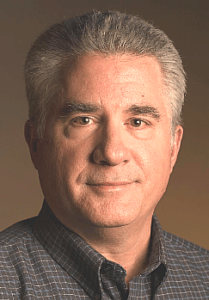I stopped by the bank the other day to cash a few checks for pocket money. The teller already was having a bad day, I surmised, as she completed a tense conversation with a co-worker while I approached her window.
“One of these will need special handling,” she snapped after I handed her the checks. I explained — calmly, I thought — that I cashed the same checks every month at that branch with no problem.
“I didn’t say I couldn’t cash it,” she almost spat out. “I said it would need special handling, OK?”
Taken aback, I bit my tongue and nodded.
“I’m sorry you’re upset with me,” she added while processing the checks.
“I’m not upset,” I protested. “Why do you feel that way?” Stony silence.

Erich Bridges
At that point, I decided, silence was the better part of valor on my part, too, if I wanted to get my money. We completed the transaction and I left.
Now, I’ve been known to complain in public over the years about bad service, obnoxious noise and other irritations, as my traumatized kids (now adults) can tell you. But this time? I was convinced I was an innocent bystander. I chalked up the incident to a tired, stressed-out worker expressing frustration and went about my business.
Thinking about it later, however, I wondered if the unpleasant encounter wasn’t at least partly my fault. Had my expression communicated annoyance? Maybe I unconsciously gave her the “stink eye.” Or maybe it was my resting jerkface.
Resting jerkface has two definitions, according to the Urban Dictionary:
- When your resting facial expression makes you look like a jerk.
- When being a jerkface is, in fact, your default personality setting.
I’ve been guilty of living out the second definition so many times that the first definition may describe my permanent expression, whether I’m aware of it or not. That’s not the way to approach interactions with other people.
I doubt Jesus employed the stink eye, except maybe with the Pharisees. He definitely didn’t use it with the tax collectors, prostitutes and sinners. They already were living with enough shame and rejection.
I try to be especially conscious of my facial expression and tone of voice at the church food pantry/clothes closet/shower service where I volunteer once a week. The ministry caters mostly to homeless people. Many are as sweet as they can be. But some come in with an attitude or list of demands. Others arrive talking nonsense because of mental issues or the influence of drugs and alcohol.
“The best and most effective response, as Scripture teaches, is kindness.”
You can’t let the few ornery clients walk all over you. But the best and most effective response, as Scripture teaches, is kindness. Put yourself in their place: How cheerful would you be after sleeping rough for months, or years, in the heat, the rain and the cold?
We have a lot of regulars, some of whom are elderly. Some hobble in pushing walkers loaded down by their grimy possessions. Like Jim. Veteran volunteers tell me Jim has a master’s degree, but alcohol did him in. He looks like Santa Claus after a month-long bender. You can smell his sour, filthy clothes from six feet away. His hands tremble. But he’s sober in the afternoons when he comes in, and he thanks us for the food and a shower. We make a point of giving him a little extra, talking to him, helping him to the exit.
Then there’s Pluto, a young guy who always spends at least 40 minutes in the shower. And Tree, who wants extra food and is very particular about items he will and won’t accept.
Mike, my special buddy, is 60-ish. He’s wiry and street-smart, but he’s moving slower these days. He’s been sleeping outside for about 20 years. He says he doesn’t mind it except when it rains. He can converse knowledgeably about almost any topic. He takes a shower, then sits by the wall until closing time, when he tips the coffee urn into his thermos to get what’s left for the road. He nods at me and grins as he heads for his bike locked up outside.
One older guy came in a few weeks ago for food, but mostly to talk. He was distraught after losing his day-labor job. The supervisor told him to pick up something heavy, but he has back trouble and just couldn’t do it. What bothered him more than getting fired was the way he was treated. He had tears in his eyes.
“Homeless people already face enough indifference, hostility and hardship without me making their day any harder.”
God help me if I ever pull a jerkface on one of these people. A couple of the other volunteers who are sticklers for the rules of the pantry scold me about being too much of a soft touch. I can’t help it. Homeless people already face enough indifference, hostility and hardship without me making their day any harder. If a few take advantage, so be it.
Mother Teresa started the Missionaries of Charity to minister to the sick, the dying, the poor and the rejected. She insisted that her sisters have a joyful inner attitude — and a “big smile” on their faces — before they began their daily work.
“If one of my sisters is not at least in a serene mood, I do not allow her to go visit the poor,” she said. “The poor already have so many reasons to feel sad; how could we take them the affliction of our own personal bad moods?”
The effective missionary, Teresa stressed, “has to be extremely kind and gentle — in touch of hand, in tone of voice, in her smile, because the work is very delicate. An unkind word or look is enough to spoil the work. … I prefer our sisters to make mistakes through kindness than to work miracles through harshness and unkindness. … The poor are not at our service. If we want the poor to see Christ in us, we must first see Christ in the poor.”
“If we want the poor to see Christ in us, we must first see Christ in the poor.”
And in the sick, the prisoner, the refugee, the stranger. Maybe even in the irritated, stressed-out bank teller. These people are Christ in his “distressing disguise,” as Teresa often said.
To be honest, I find it a lot easier to be kind to the homeless for an hour or two a week than to be kind to other folks I meet in random situations. But they are Christ in disguise, too.
Lord, help me get rid of my resting jerkface.
Erich Bridges, a Baptist journalist for more than 40 years, retired in 2016 as global correspondent for the Southern Baptist Convention’s International Mission Board. He lives in Richmond, Va.
Related articles:
Have you heard the one about empathy being a sin?
The recovery of empathy | Opinion by Stephen Shoemaker


